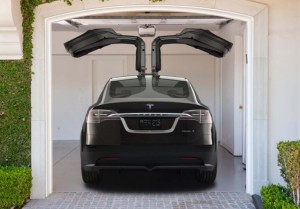After running up the stock in a frenzy more familiar to high-tech companies like Apple and Google than those in the automotive world, investors have suddenly grown wary about battery-carmaker Tesla Motors. But whether this is a short-term or long-term problem is unclear.
Traded as TSLA, Tesla’s stock is down sharply from an October high of $260 – and a 52-week peak of $291.42. It closed Thursday at $226.35 and analysts will be watching to see whether it can regain momentum during the week’s final day of trading.
Tesla is by no means alone. Tech and automotive stocks have all been hammered by what appears to be a significant correction on Wall Street. But there are a number of problems unique to the battery-car company, including concerns that its second product line, the Model X SUV, could yet again be delayed. Even the maker’s CEO and founder has quested whether Tesla shares were “kinda high” before the stock tumbled.
Even at $226 a share, Tesla remains a high-flyer from an automotive perspective. Ford is trading below $14 after announcing some bad news about recall costs and its European operations. General Motors has tumbled this month, as well, and newly minted shares of Fiat Chrysler Automobiles fell on their first day of trading last week.
But for awhile, it seemed like there was no downside for Tesla which was barely in the $20 range early in 2013 before skyrocketing after the launch of its first major product, the Model S sedan. Proponents have positioned Tesla as the start of an automotive revolution, one that investors have been trading more like high-tech stocks than car shares. In fact, even now, TSLA is worth nearly 2.5 times more than Apple, though less than half of what Google is trading at.
But as with high-tech shares, investor love can go astray quite quickly. Morgan Stanley’s influential analyst Adam Jonas, who only recently predicted Tesla will go “dynamite fishing” when the Model X arrives, may have encouraged the latest sell-off by warning of a “slight delay” in the planned mid-year 2015 launch of the battery ute – which had already been pushed back.
On the positive side, Jonas suggested any additional hold on production will help Tesla ensure the quality and performance of the new Model X. Tesla is sticking with its earlier launch target, but if the Morgan Stanley analyst is correct, it would mean the maker must rely on a single product even longer, risking reduced earnings – and the possibility that demand for the Model S might slack off.
The reference to quality control may also be striking a resonant chord. Early on, the Model S was covered in rose pedals as it received kudos such as the Motor Trend Car of the Year award, and a review from influential Consumer Reports magazine which hailed the battery sedan as one of the two best vehicles it ever tested. But the non-profit publication has since raised concerns about potentially serious quality problems. Tesla was also engaged in a short but embarrassing battle with a Wisconsin owner who wanted his Model S repurchased under the state’s Lemon Law.
Investors also seemed less than enthralled by the new versions of the Model S Musk and company announced earlier this month. After issuing his usual series of Twitter and blog teases, the CEO revealed an all-wheel-drive version of the Model S, along with a high-performance package. He also showed off an “auto-pilot” concept that would allow semi-autonomous highway driving – but that falls short of the fully autonomous features several other automakers are promising.
(For more on Tesla’s new all-wheel-drive, performance and “auto-pilot” technologies, Click Here.)
Adding further downward momentum, Tesla continues to run into obstacles as it tries to roll out a nationwide network of factory-owned showrooms. Michigan lawmakers have passed a measure that would effectively bar that approach – which is also prohibited in a number of other states, such as Texas.
That may explain why Musk said during an interview on Autoline Today that Tesla is now looking at a hybrid approach that could include some factory stores and some run by franchisees.
(Will Tesla add franchised dealers after all? Click Here for more on that story.)
Musk has been a rare force in the automotive world, an executive whose words are closely parsed by analysts, investors, the news media and consumers alike for clues as to what is coming from Tesla. So, perhaps, his own skepticism is playing a factor in the company’s stock slide. He cautioned that TSLA may be trading “kinda high” even as it began to dip.
He has said similar things in the past as Tesla traded ever higher. Maybe this time, however, investors are taking him at his word.
(A battle of the super-premium cars is brewing as Caddy preps new CT8, Audi its A9. Click Here for more.)


Carnival barker.
I’d be concerned about the NYT review of the BMW I8, which referenced the Model S unfavorably. Even though the I8 is more expensive, I’d say they’re both appealing to the same people. If potential Tesla buyers start to cross-shop the I8, there could be trouble in Musk City.